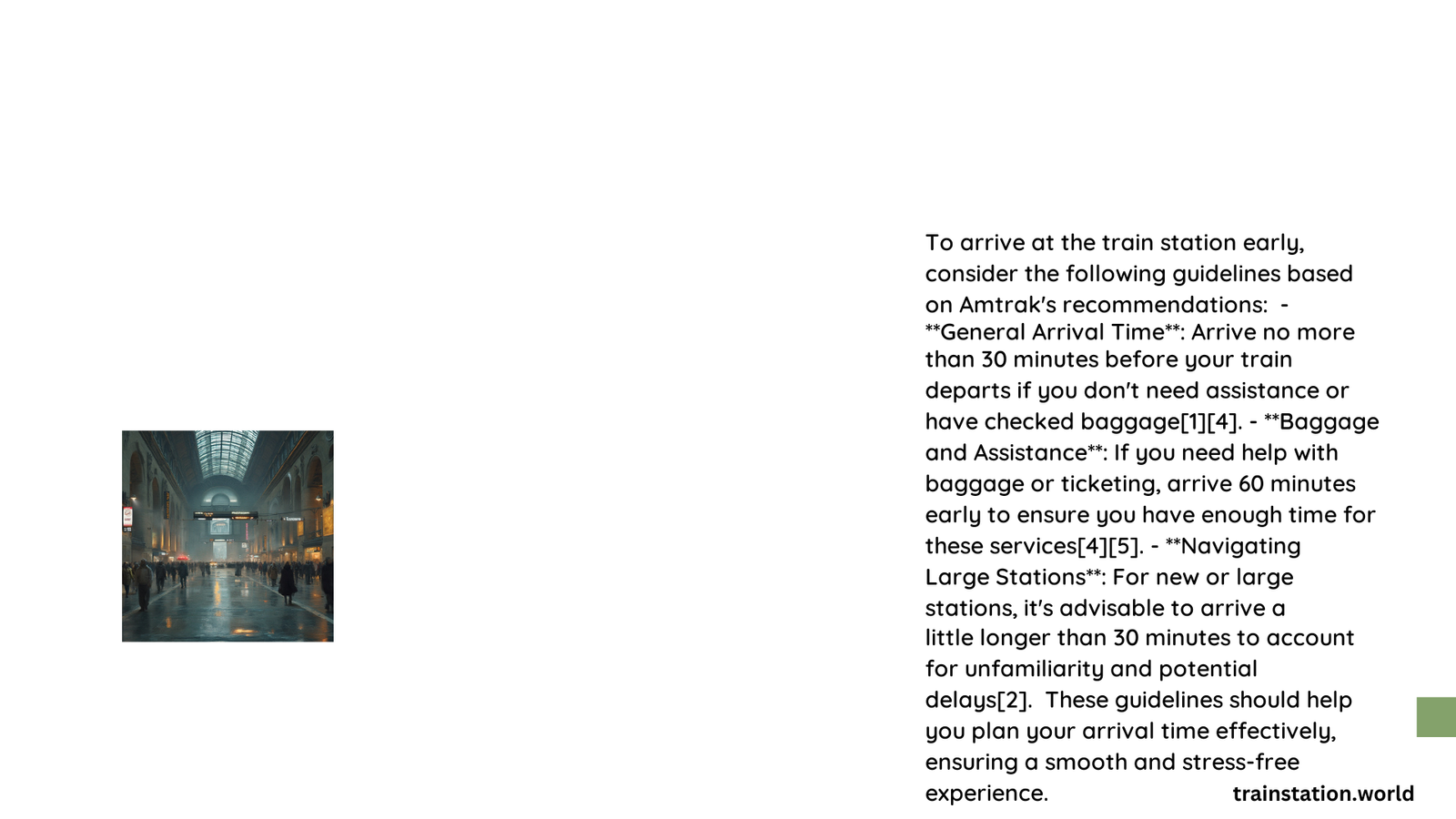Arriving at the train station on time is crucial for a stress-free journey. The recommended arrival time varies depending on factors such as domestic or international travel, specific train services, and station size. Generally, for domestic trains, arriving 20-30 minutes before departure is sufficient, while international journeys may require earlier arrival. This article provides detailed guidance on how early you should arrive at the train station for various scenarios.
What Are the General Guidelines for Arrival Times?
The general guidelines for arrival times at train stations can be summarized as follows:
- Domestic trains: 20-30 minutes before departure
- International trains: 30-60 minutes before departure
- High-speed trains (e.g., Eurostar, Thalys): At least 30 minutes before departure
- Large, busy stations: Add 10-15 minutes to the recommended time
These guidelines ensure you have enough time to navigate the station, find your platform, and board comfortably.
How Does the Type of Train Service Affect Arrival Time?

Different train services have varying requirements for arrival times:
| Train Service | Recommended Arrival Time | Reason |
|---|---|---|
| Domestic | 20-30 minutes | Standard boarding procedures |
| Eurostar | At least 30 minutes | Security checks and check-in |
| Thalys | 30 minutes | Identity verification at certain stations |
| OUIGO | 30 minutes | Specific boarding requirements |
For Eurostar and other international services, earlier arrival is necessary due to additional security measures and check-in procedures.
What Factors Influence the Recommended Arrival Time?
Several factors can influence how early you should arrive at the train station:
- Station size and complexity
- Peak travel hours
- Ticket purchase requirements
- Luggage handling needs
- Station amenities you wish to use
- Mobility requirements
Larger stations or travel during busy periods may necessitate earlier arrival to navigate crowds and potential queues.
How Does International Travel Differ from Domestic Travel?
International train travel often requires earlier arrival times compared to domestic journeys:
- Domestic Travel:
- Usually 20-30 minutes before departure
- No specific check-in required
-
Board until a few minutes before departure
-
International Travel:
- 30-60 minutes before departure
- May require check-in and security procedures
- Specific requirements for services like Eurostar
International travelers should be prepared for potential passport checks and longer queues, especially at border crossings.
What Are the Benefits of Arriving Early at the Train Station?
Arriving early at the train station offers several advantages:
- Reduced stress and anxiety
- Time to familiarize yourself with the station layout
- Opportunity to use station amenities (e.g., restrooms, food outlets)
- Buffer for unexpected delays or issues
- Chance to make last-minute ticket changes or upgrades
- More relaxed boarding experience
Early arrival can significantly enhance your overall travel experience and start your journey on a positive note.
How Do Station Amenities Impact Arrival Time?
The amenities available at train stations can influence how early you might want to arrive:
- Food and Beverage: If you plan to grab a meal or coffee before your journey, add 15-20 minutes to your arrival time.
- Shopping: For stations with retail options, arrive 30 minutes early if you want to browse or make purchases.
- Lounges: If you have access to a station lounge, consider arriving 45-60 minutes early to make use of the facilities.
- Luggage Storage: If you need to use left luggage facilities, add 15-20 minutes to your arrival time.
What Are the Specific Check-in Guidelines for Different Train Services?
Different train services have varying check-in requirements:
- Domestic Trains:
- No formal check-in required
- Board up until a few minutes before departure
-
Pre-purchased tickets can streamline the process
-
Eurostar:
- Check-in at least 30 minutes before departure
-
Passengers with disabilities: Arrive 1 hour before
-
OUIGO:
- Arrive 30 minutes before departure
-
Boarding not guaranteed if less than 5 minutes before departure
-
Thalys:
-
Additional 30 minutes recommended for identity and baggage checks at certain stations
-
Ticket Validation:
- Many trains require ticket validation before boarding
- Prepare tickets (printed or mobile) in advance
How Do Peak Hours and Station Size Affect Arrival Time?
Peak hours and station size can significantly impact the recommended arrival time:
- Peak Hours:
- Longer queues at ticket booths and security checks
-
Arrive 10-15 minutes earlier than usual during rush hours
-
Major Train Stations:
- Large stations like Edinburgh Waverley, Paris Gare du Nord, or London St Pancras require earlier arrival
- Add 15-20 minutes to account for station complexity and potential crowds
What Are the Consequences of Arriving Late at the Train Station?
Arriving late at the train station can lead to several issues:
- Missing your train
- Rushed and stressful boarding experience
- No time for last-minute ticket changes or upgrades
- Inability to use station amenities
- Potential additional costs for rebooking
- Disruption to onward travel plans
To avoid these problems, always aim to arrive at the recommended time or earlier.
How Can I Optimize My Arrival Time at the Train Station?
To optimize your arrival time at the train station:
- Check the specific requirements for your train service
- Consider the station size and complexity
- Account for peak travel times
- Plan for any station amenities you wish to use
- Allow extra time if you’re unfamiliar with the station
- Use mobile apps or station information boards for real-time updates
- Have your tickets and travel documents ready in advance
By following these tips, you can ensure a smooth and stress-free start to your train journey.
